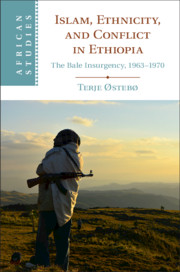Book contents
- Islam, Ethnicity, and Conflict in Ethiopia
- African Studies Series
- Islam, Ethnicity, and Conflict in Ethiopia
- Copyright page
- Dedication
- Contents
- Maps
- Figures
- Tables
- Acknowledgments
- Map
- 1 Introduction
- 2 Islaama Peoplehood and Landscapes of Bale
- 3 Conquest and Resistance
- 4 Bale at War
- 5 The Insurgency: Fighters and Fragmentation
- 6 Peasant Insurgency without Peasants
- 7 Land Tenure and the Land-Clan Connection
- 8 Christianity, Nation, and Amhara Peoplehood
- 9 Trans-local Dynamics: The Bale Insurgency in the Context of the Horn
- 10 Islaama vs Amhara and the Making of Local Antagonism
- 11 The Bale Insurgency, Islaama, and Oromo Ethno-nationalism
- 12 Conclusions
- Glossary
- References
- Index
- African Studies Series
8 - Christianity, Nation, and Amhara Peoplehood
Published online by Cambridge University Press: 28 September 2020
- Islam, Ethnicity, and Conflict in Ethiopia
- African Studies Series
- Islam, Ethnicity, and Conflict in Ethiopia
- Copyright page
- Dedication
- Contents
- Maps
- Figures
- Tables
- Acknowledgments
- Map
- 1 Introduction
- 2 Islaama Peoplehood and Landscapes of Bale
- 3 Conquest and Resistance
- 4 Bale at War
- 5 The Insurgency: Fighters and Fragmentation
- 6 Peasant Insurgency without Peasants
- 7 Land Tenure and the Land-Clan Connection
- 8 Christianity, Nation, and Amhara Peoplehood
- 9 Trans-local Dynamics: The Bale Insurgency in the Context of the Horn
- 10 Islaama vs Amhara and the Making of Local Antagonism
- 11 The Bale Insurgency, Islaama, and Oromo Ethno-nationalism
- 12 Conclusions
- Glossary
- References
- Index
- African Studies Series
Summary
The chapter explores the role of Christianity in the Ethiopian national narrative and in state policies. The first part analyzes the Ethiopian national narrative as embodied in a semi-divine imperial genealogy and tied to a territorial state viewed as demarcated by God. The chapter subsequently discusses the notion of Amhara peoplehood, underscoring its religious (Christian) dimension. This serves as the basis for understanding the Amhara’s expansionist ideology and encounters with different ethnic and non-Christian groups, and the chapter discusses how the state’s expansionist endeavors were accompanied by the Amhara notion of exceptionalism that paved the way for civilizational policies, in turn leading to the demarcation of rigid boundaries and asymmetric relationships with non-Amhara groups. The latter part of the chapter focuses on how this paved the way for a policy of withdrawal as well as resistance from Muslim groups. It underscores how the Muslims viewed the state as a Christian opposite and the negative treatment of the Muslims as religiously based. It moreover discusses how this reciprocally led to the strengthening of the religious dimension of peoplehood among Muslims from different localities and also became a powerful force for mobilizing action against the Ethiopian state.
- Type
- Chapter
- Information
- Islam, Ethnicity, and Conflict in EthiopiaThe Bale Insurgency, 1963-1970, pp. 209 - 233Publisher: Cambridge University PressPrint publication year: 2020

